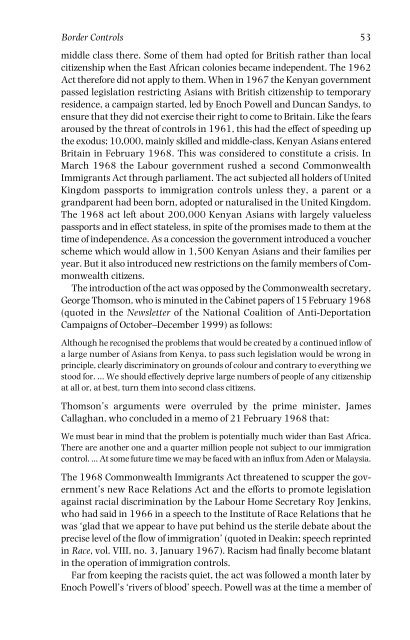Open%20borders%20The%20case%20against%20immigration%20controls%20-%20Teresa%20Hayter
Open%20borders%20The%20case%20against%20immigration%20controls%20-%20Teresa%20Hayter
Open%20borders%20The%20case%20against%20immigration%20controls%20-%20Teresa%20Hayter
You also want an ePaper? Increase the reach of your titles
YUMPU automatically turns print PDFs into web optimized ePapers that Google loves.
Border Controls 53<br />
middle class there. Some of them had opted for British rather than local<br />
citizenship when the East African colonies became independent. The 1962<br />
Act therefore did not apply to them. When in 1967 the Kenyan government<br />
passed legislation restricting Asians with British citizenship to temporary<br />
residence, a campaign started, led by Enoch Powell and Duncan Sandys, to<br />
ensure that they did not exercise their right to come to Britain. Like the fears<br />
aroused by the threat of controls in 1961, this had the effect of speeding up<br />
the exodus; 10,000, mainly skilled and middle-class, Kenyan Asians entered<br />
Britain in February 1968. This was considered to constitute a crisis. In<br />
March 1968 the Labour government rushed a second Commonwealth<br />
Immigrants Act through parliament. The act subjected all holders of United<br />
Kingdom passports to immigration controls unless they, a parent or a<br />
grandparent had been born, adopted or naturalised in the United Kingdom.<br />
The 1968 act left about 200,000 Kenyan Asians with largely valueless<br />
passports and in effect stateless, in spite of the promises made to them at the<br />
time of independence. As a concession the government introduced a voucher<br />
scheme which would allow in 1,500 Kenyan Asians and their families per<br />
year. But it also introduced new restrictions on the family members of Commonwealth<br />
citizens.<br />
The introduction of the act was opposed by the Commonwealth secretary,<br />
George Thomson, who is minuted in the Cabinet papers of 15 February 1968<br />
(quoted in the Newsletter of the National Coalition of Anti-Deportation<br />
Campaigns of October–December 1999) as follows:<br />
Although he recognised the problems that would be created by a continued inflow of<br />
a large number of Asians from Kenya, to pass such legislation would be wrong in<br />
principle, clearly discriminatory on grounds of colour and contrary to everything we<br />
stood for. ... We should effectively deprive large numbers of people of any citizenship<br />
at all or, at best, turn them into second class citizens.<br />
Thomson’s arguments were overruled by the prime minister, James<br />
Callaghan, who concluded in a memo of 21 February 1968 that:<br />
We must bear in mind that the problem is potentially much wider than East Africa.<br />
There are another one and a quarter million people not subject to our immigration<br />
control. ... At some future time we may be faced with an influx from Aden or Malaysia.<br />
The 1968 Commonwealth Immigrants Act threatened to scupper the government’s<br />
new Race Relations Act and the efforts to promote legislation<br />
against racial discrimination by the Labour Home Secretary Roy Jenkins,<br />
who had said in 1966 in a speech to the Institute of Race Relations that he<br />
was ‘glad that we appear to have put behind us the sterile debate about the<br />
precise level of the flow of immigration’ (quoted in Deakin; speech reprinted<br />
in Race, vol. VIII, no. 3, January 1967). Racism had finally become blatant<br />
in the operation of immigration controls.<br />
Far from keeping the racists quiet, the act was followed a month later by<br />
Enoch Powell’s ‘rivers of blood’ speech. Powell was at the time a member of


